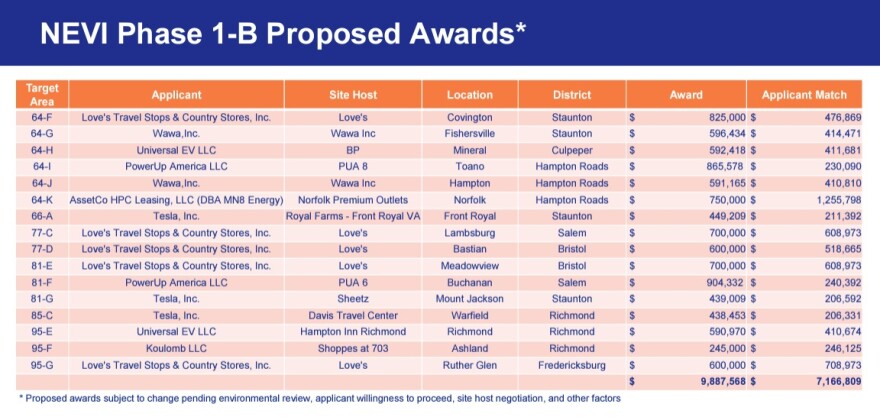This story was reported and written by our media partner the Virginia Mercury.
The Virginia Department of Transportation announced the next round of recipients to receive federal funding to build electric vehicle charging stations along interstates and state highways.
The awardings, presented by VDOT to the Commonwealth Transportation Board at its Oct. 22 meeting, total about $22 million for chargers at 35 different locations from 19 different applicants, six of which are the recipients for more than one location.
The funding comes from the National Electric Vehicle Infrastructure (NEVI) Program, which is part of the bipartisan Infrastructure and Jobs Act and which awarded Virginia $106 million for electric vehicle charging stations built over a five-year period.
The stations will be fast-charging with at least four ports, built within federally-designated “alternative fuel corridors” alongside interstate and highways, and be located within a 50-mile distance from the next charger.
The buildout of the electric vehicle charging stations is seen as critical to the adoption of electric vehicles to reduce climate changing emissions from tailpipes. In Virginia and the rest of the country, about one-third of planet-warming gasses come from the transportation sector.
But as drivers have concerns over how far they can drive electric vehicles within the current charging station network, particularly in rural areas, automakers have scaled back pledges to transition fleet offerings from gas to fully electric cars. Some Republican politicians,, including Gov. Glenn Youngkin, have scaled back Democratic desires to require new car sales be electric starting in 2035.
In March, VDOT announced the initial awarding of about $11 million for 18 different locations along interstates. The latest funding round expands EV charging options along interstates and adds new locations on state highways.


PREVIOUS COVERAGE: How Hampton Roads is preparing for more electric vehicles on the road
Among them are six stations along Interstate 64, one on Interstate 66, two along Interstate 77, two along Interstate 81, one on Interstate 85 and three along Interstate 95. On the state highway front, six are proposed for Route 17, two for Route 23, six for Route 29 and five for Route 460.
The latest charging stations are proposed for a variety of location types, including 63% at convenience stores and gas stations and travel centers, 17% at hotels and motels, 11% at dining and shopping/grocery stores and 9% at “new construction or other” locations.
A mix of electric vehicle charging station developers and gas stations, like Wawa, are among the recipients. The average award is about $647,657 with applicants providing an average match amount of about 36% of the total project cost.
The proposed awards are subject to environmental reviews, an applicant’s desire to continue, site host agreements and other factors before coming online, but VDOT officials presented to the CTB a timeline of issuing notices to proceed between March and May of next year.
Over the summer, VDOT officials told The Mercury that the charging station build-out was expected to be completed within two years of when a notice to proceed is issued. But supply chain issues around transformers, which are needed to deliver power from the grid to specific locations, added a six to 18- month delay on the completion of projects.
While the first charger for the initial round of stations is expected to be in use by the end of this year, installation of chargers from this second round of funding could begin next year and extend into 2026.
VDOT is planning to use future NEVI funds to meet the every 50-mile requirement, including stations on Route 17 and Route 29 south of Warrenton and Route 460 east of Appomattox County. Remaining funds may be used for Phase 2 opportunities, including chargers for tractor-trailers.


